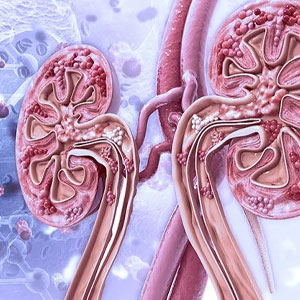systemic lupus nephritis in anantapur
Lupus nephritis is a common complication associated with systemic lupus erythematosus, commonly referred to as lupus. Lupus is classified as an autoimmune disease, wherein the immune system erroneously targets and damages the body's own cells and organs. This condition prompts the immune system to produce proteins known as autoantibodies, which subsequently attack various tissues and organs, including the kidneys. Lupus nephritis arises when these autoantibodies interfere with the kidney structures responsible for waste filtration. This interaction leads to inflammation, characterized by swelling and irritation of the kidneys needing Systemic Lupus Nephritis Treatment in Anantapur. Symptoms may include the presence of blood and protein in the urine, elevated blood pressure, impaired kidney function, and in severe cases, kidney failure.
Causes
Approximately fifty percent of adults diagnosed with systemic lupus erythematosus develop lupus nephritis per Best Lupus Nephritis Doctor in Anantapur. This condition results in swelling and irritation of the kidneys, known as inflammation. It can manifest as blood in the urine, proteinuria, elevated blood pressure, impaired kidney function, or potentially kidney failure. Systemic lupus erythematosus prompts the immune system to attack the kidneys, hindering their ability to effectively filter waste products and need immediate consultation at Kidney disease hospital in Anantapur.

Risk Factors
The recognized risk factors for lupus nephritis per Best Kidney specialist in Anantapur include
- Male gender - Although lupus is more prevalent among women, men are more frequently diagnosed with lupus nephritis compared to women.
- Race or ethnicity – Some people are at a higher risk of developing lupus nephritis than their white counterparts.
Complications
Without appropriate diagnosis and treatment, lupus nephritis (LN) typically deteriorates progressively, potentially resulting in kidney failure. This critical condition arises when more than 90% of kidney function is compromised. In the event of kidney failure, dialysis or a kidney transplant becomes necessary for survival. Lupus nephritis may lead to several complications, including:
- Elevated blood pressure.
- Renal failure.
- An increased likelihood of developing cancer, particularly B-cell lymphoma, which originates in immune system cells.
- An augmented risk of cardiovascular and vascular issues.
Medications prescribed for Lupus primarily aim to inhibit the hyperactive immune system from damaging the kidneys. Additionally, certain drugs are utilized to maintain kidney health. Treatment approaches vary based on the classification of the disease. Regardless of the classification, the condition is typically managed with medications that promote a balanced immune response.
Furthermore, anti-hypertensive medications are frequently advised, even in the absence of elevated blood pressure. Your nephrologist, Dr. M. Surendra Babu will likely devise a treatment strategy tailored to your specific disease classification, ensuring optimal kidney function. These strategies may encompass straightforward monitoring or more potent medications designed to alleviate symptoms and avert further kidney damage.
